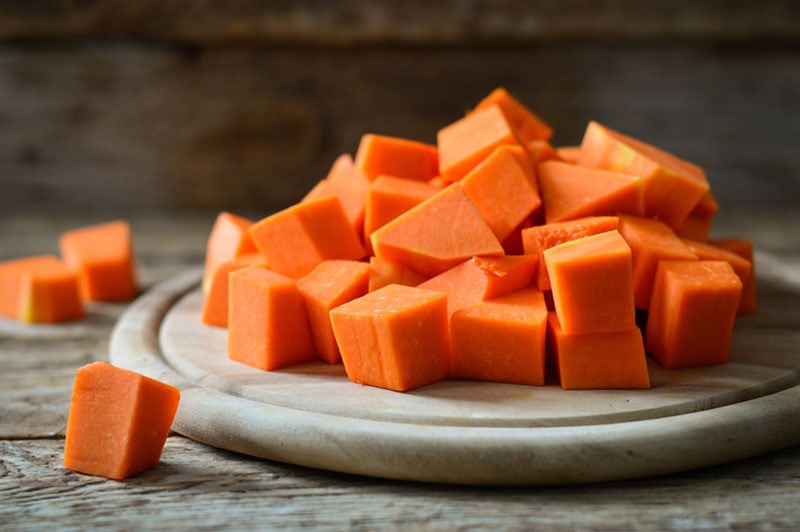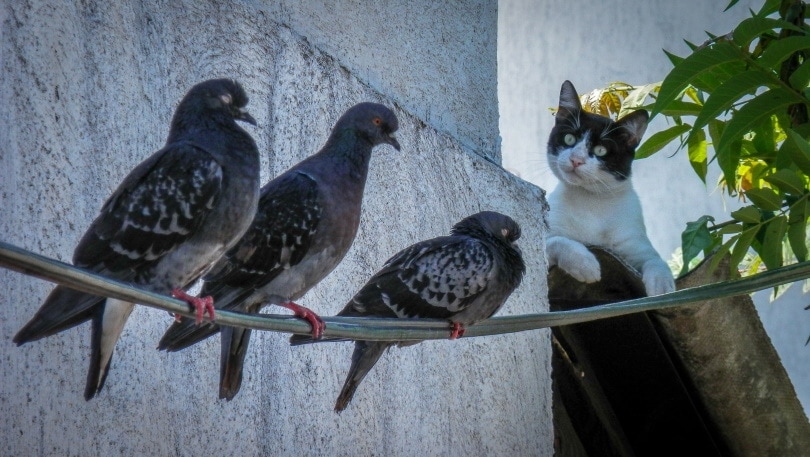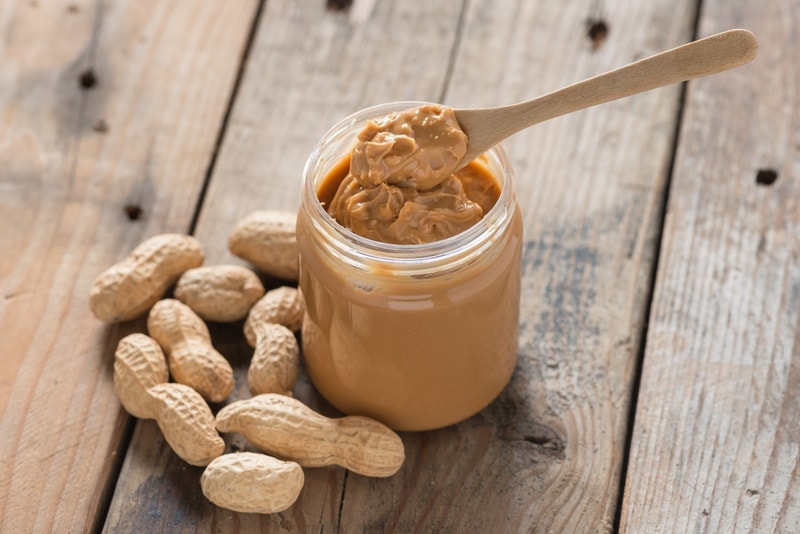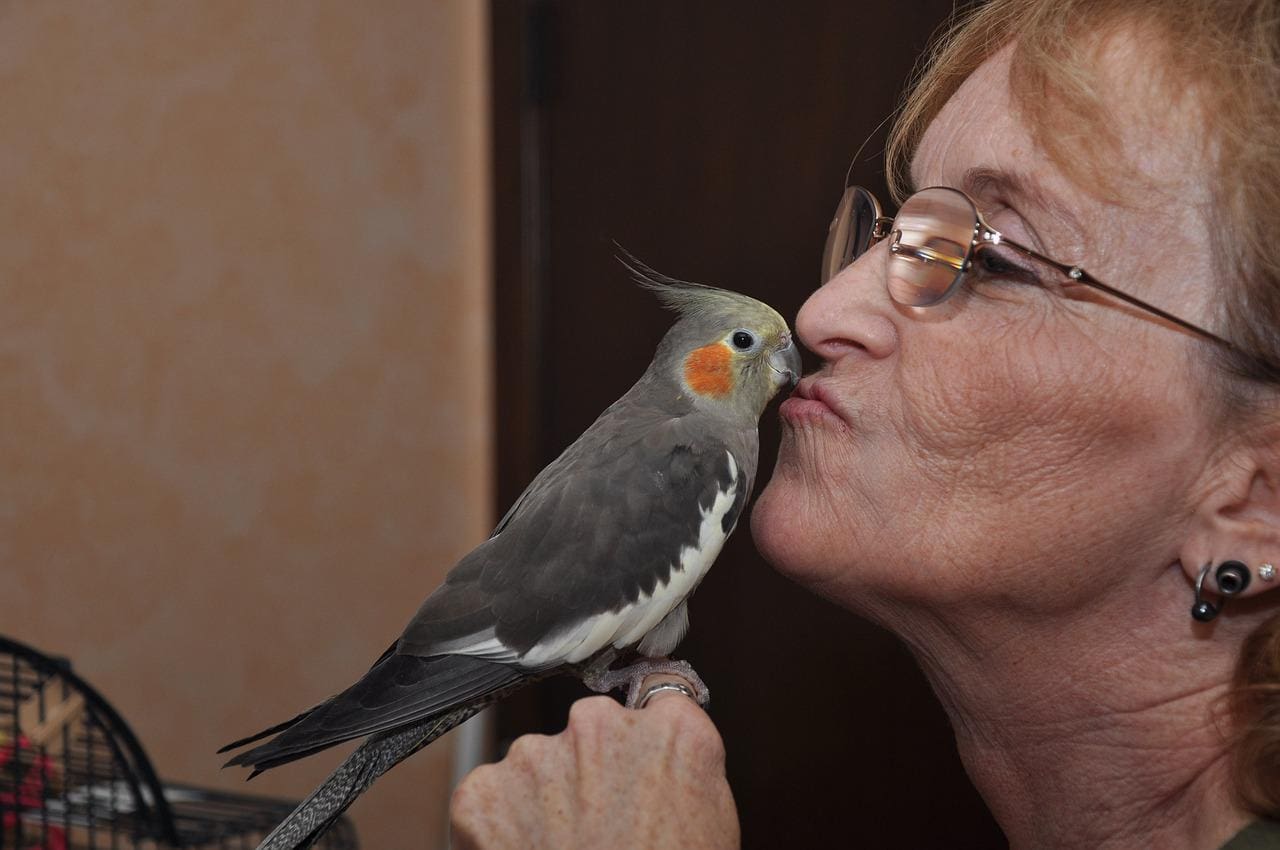Can Parrots Eat Pumpkin? Vet-Approved Facts & FAQ
By Kit Copson
Updated on

Click to Skip Ahead
Your parrot’s diet should be as varied and colorful as they are, which means plenty of nutritious fresh vegetables and fruit to supplement their regular pellets. Pumpkin and pumpkin seeds are safe, healthy options that many parrots enjoy, but they should always be balanced with a variety of other food items to make sure your feathered friend is getting a good mix of nutrients.
Read on as we explore the potential health benefits of feeding pumpkin to parrots and how you can include pumpkin in your parrot’s diet.
Health Benefits of Pumpkin for Parrots
Pumpkin, which is a type of winter squash (and technically a fruit, not a vegetable), is a great source of vitamin A, which helps keep your parrot’s immune system working properly and their skin, feathers, and color in tip-top condition. Vitamin A is also crucial for other areas of health, including eye, bone, and respiratory health, and for repairing tissues.
It’s essential that parrots are offered a variety of foods containing vitamin A, as an imbalance of this vitamin can cause some serious health consequences. This issue is commonly seen in parrots that are fed all-seed diets.
Signs of a vitamin A deficiency include dull, brittle, and/or discolored feathers, nose or eye discharge, eye swelling, itchy and flaky skin, feather plucking, and a deformed beak and toenails. Serious kidney problems can occur in some cases.
In addition to pumpkins, other sources of vitamin A include carrots, sweet potatoes, squash vegetables, red peppers, papaya, mango, broccoli, collards, and spinach, though this list is not exhaustive. As well as providing a vitamin A boost, pumpkin is also a source of calcium, magnesium, phosphorus, and potassium, all of which, like vitamin A, are very important for your parrot.

What About Pumpkin Seeds?
The great thing about pumpkins is that they also provide seeds, and parrots absolutely love cracking into these. Better yet, pumpkin seeds are a source of fiber, iron, magnesium, potassium, and phosphorus. You can take them out of the pumpkin yourself or offer them dried. Either is fine, just be sure there’s no added salt or sugar.
Bear in mind that seeds should be fed in moderation, and they should never be the only thing you feed your parrot—balance and variety are key. Though pumpkin seeds contain healthy fats, they are high in these, so too many of these seeds aren’t good for your parrot.
For appropriate serving sizes, consider sprinkling a few pumpkin seeds into your parrot’s salad now and then, or hiding some inside a foraging toy to keep them busy.
Can All Parrots Eat Pumpkin?
Yes, pumpkin is fine for all kinds of parrots, big and small, including budgies, macaws, African Greys, Amazons, parakeets, and lovebirds. However, since parrots come in all shapes and sizes, the portion sizes you offer will need to be adapted.
Furthermore, the dietary needs may differ slightly. For example, macaws tend to seek out more nuts than other species in the wild due to their need for higher fat levels. We strongly recommend speaking to a vet or avian specialist about the specific needs of your parrot species.
How to Include Pumpkin in Your Parrot’s Diet
A balanced and varied parrot diet is made up of species-specific commercial pellets (50–70% of the overall diet), veggies, fruits, whole grains (cooked), legumes (soaked and cooked or sprouted), and nuts and seeds (raw, soaked, or sprouted).
Like every other fruit and vegetable, pumpkins should be offered in moderation to prevent tummy upset. You can easily incorporate pumpkin into your parrot’s diet by chopping up some pieces and putting them into a salad with other veggies and fruits your parrot likes. To get the most out of the pumpkin, it is best served raw. However, you can offer your parrot some cooked pumpkin, provided it hasn’t been mixed with any seasonings or flavorings. Avoid canned pumpkin, and definitely no pumpkin pie filling!
Some people make “chop” for their parrots, which is a blend of cooked grains and legumes mixed with chopped veggies and fruits. Small amounts of seeds and nuts can be popped in, too, for a bit of extra crunch.

Other Parrot-Safe Veggies & Fruits
To reiterate, variety is key for keeping your parrot satisfied and healthy, so make sure those pumpkin pieces are in good company with some of these other parrot-safe veggies and fruits:
- Bell peppers
- Collard greens
- Broccoli
- Kale
- Spinach
- Parsley
- Hot peppers
- Winter squashes
- Beets
- Asparagus
- Carrots
- Dandelion greens
- Zucchini
- Mustard greens
- Chicory
- Alfalfa
- Turnip greens
- Chard
- Apples
- Bananas
- Cranberries
- Oranges
- Pomegranate
- Dark berries
- Papaya
- Mango
- Peaches
- Pomegranate
What Can’t Parrots Eat?
Although the list of foods that are safe for parrots is long, they don’t have the green light to eat every kind of food, including some vegetables and fruits. Reasons vary from toxicity to simply being very unhealthy for your bird. Unsafe ingredients include:
- Onions
- Garlic
- Rhubarb
- Avocado
- Alcohol
- Dairy products
- Peanuts in the shell (these can harbor mold)
- Uncooked beans
- Chocolate
- Caffeine
- Fatty foods
- Sugary foods
- Some mushroom varieties
- Nightshade plant parts (leaves, stems, etc.)
- Fruit pits
- Apple and pear seeds
- Xylitol
Final Thoughts
If you’ve been worrying because your parrot got their beak into some pumpkin, you can relax; neither the fruit nor the seeds are harmful to them at all, and in fact, are quite healthy. That said, pumpkin should only be a part of your parrot’s overall diet. They can’t get all the nutrients they need from one single type of fruit or vegetable.
Don’t forget to provide lots of options in addition to pumpkin and go easy on feeding the seeds—too many could cause weight gain.
See Also:
- Can Parrots Eat Carrots? Vet Approved Facts & FAQ
- Can Parrots Eat Pumpkin Seeds? Vet-Verified Nutritional Facts & FAQ
Featured Image Credit: onebit, Shutterstock













